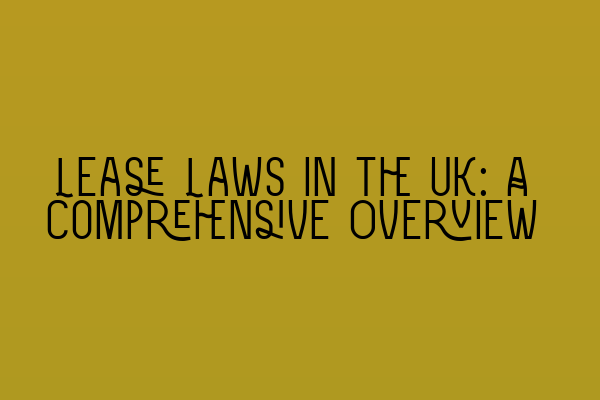Lease Laws in the UK: A Comprehensive Overview
Lease laws play a crucial role in the UK property market, governing the rights and responsibilities of both landlords and tenants. Whether you are a property owner, a tenant, or a legal professional specializing in property law, understanding the intricacies of lease laws is essential to effectively navigate the rental market. In this comprehensive overview, we will delve into the key aspects of lease laws in the UK, covering important concepts, regulations, and rights that are relevant to both residential and commercial leases.
What is a Lease?
At its core, a lease is a legal agreement between the landlord (the property owner) and the tenant (the individual or business occupying the property). The lease outlines the terms and conditions under which the tenant can occupy the property for a specified period of time, usually in exchange for rental payments. Both parties are bound by the terms of the lease, which sets out their respective rights and obligations.
Types of Leases
There are different types of leases in the UK, with the most common ones being residential leases and commercial leases. Residential leases are typically used for letting out properties to individuals or families for residential purposes. On the other hand, commercial leases are used for business premises, such as offices, retail spaces, and warehouses.
Residential Lease Laws
Residential leases are governed by various laws and regulations that aim to protect the rights of tenants. The most significant legislation in this area is the Landlord and Tenant Act 1985, which sets out important provisions regarding the repair and maintenance of rented properties, the rights of tenants to live in a safe and habitable environment, and the procedures for eviction.
Additionally, the Housing Act 2004 introduced mandatory tenancy deposit protection schemes, which require landlords to protect their tenants’ deposits in government-approved schemes. This ensures that tenants’ deposits are safeguarded and can be returned at the end of the tenancy, subject to any deductions for damages.
Commercial Lease Laws
Commercial lease laws in the UK provide a framework for the relationship between landlords and business tenants. Unlike residential leases, commercial leases tend to be more complex, as they involve longer-term commitments, detailed provisions for rent reviews, and clauses related to the permitted use of the premises.
One important statute governing commercial leases is the Landlord and Tenant Act 1954. This legislation grants business tenants security of tenure, which means they have a right to renew their lease at the end of the contractual term, subject to certain conditions and grounds for refusal.
Rights and Responsibilities of Landlords and Tenants
Both landlords and tenants have rights and responsibilities that are protected by lease laws. It is crucial for both parties to be aware of their obligations to maintain a healthy landlord-tenant relationship.
Landlords’ rights and responsibilities include:
1. Providing a safe and habitable property: Landlords must ensure that the property is in a safe and good condition for tenants to live or work in.
2. Carrying out necessary repairs: Landlords are responsible for maintaining the property and carrying out repairs when needed.
3. Protecting tenants’ deposits: Landlords must comply with deposit protection legislation and safeguard the tenant’s deposit in an approved scheme.
Tenants’ rights and responsibilities include:
1. Paying rent on time: Tenants must pay the agreed rent on time and in accordance with the terms of the lease.
2. Reporting repairs promptly: Tenants should notify the landlord of any necessary repairs or maintenance required.
3. Complying with the terms of the lease: Tenants are obligated to adhere to the terms and conditions outlined in the lease, including restrictions on subletting or alterations.
Dispute Resolution
Despite the best intentions of both parties, disputes can arise in landlord-tenant relationships. When such disputes occur, it is crucial to have a clear understanding of the available dispute resolution mechanisms.
Mediation and arbitration are alternative methods of resolving disputes without going to court. Mediation involves a neutral third party facilitating negotiations between the landlord and tenant, while arbitration involves a designated arbitrator who renders a legally binding decision.
However, if mediation and arbitration are unsuccessful or unsuitable in a given situation, the parties may have to resort to court proceedings to resolve their dispute. Seeking legal advice from a property law solicitor who specializes in lease disputes is recommended in such cases.
Staying Informed and Seeking Professional Advice
In the ever-evolving landscape of lease laws, staying informed is essential to ensure compliance and mitigate potential risks. If you find yourself facing a lease-related issue, seeking professional advice from a property law solicitor can provide you with the necessary expertise and guidance to resolve the matter effectively.
At SQE Property Law & Land Law, we have a team of experienced solicitors specializing in lease laws and related matters. Contact us today to schedule a consultation and discuss your lease-related concerns.
Related Articles:
– SQE 1 Practice Exam Questions
– SQE 1 Practice Mocks FLK1 FLK2
– SQE 2 Preparation Courses
– SQE 1 Preparation Courses
– SRA SQE Exam Dates
In conclusion, a solid understanding of lease laws is crucial for both landlords and tenants operating in the UK property market. Whether you are entering into a residential or commercial lease, being aware of your rights and responsibilities, as well as the relevant legislation, will help ensure a smooth and mutually beneficial landlord-tenant relationship. In case of disputes or legal complexities, seeking professional advice from a property law solicitor is highly recommended. Stay informed, stay proactive, and safeguard your interests in the dynamic world of lease laws.
